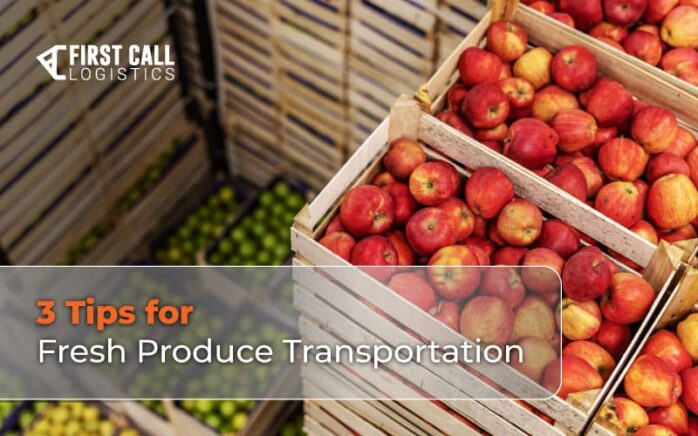3 Tips for Fresh Produce Transportation

Did you know the average U.S. resident consumes about 140 pounds of fresh vegetables each year? Multiply that figure by the 334 million people who live in the United States and you’ll start to get an idea of just how much produce is shipped annually throughout the U.S. — and that’s just for one country.
Of course, each type of produce has its own growing season, so not all of that movement happens at once (thankfully). Still, shipping produce isn’t easy, and despite extremely high demand during peak season, not all carriers are willing to take on the challenge. If you’re preparing to ship produce this season, here are three tips to help your inventory arrive on time and unspoiled.
1. Maintaining an Unbroken Cold Chain
The primary challenge we face when shipping fresh produce is the race against the clock to deliver fruits and vegetables while they’re still fresh. Maintaining a perishable product’s ideal temperature throughout the transit process is known as the cold chain. The cold chain must be maintained at all costs — even a slight variance in temperature can spoil an entire load.
Each type of produce has its own optimal range for maintaining freshness, so carriers need to be familiar with different requirements and be able to make adjustments between loads. Sometimes adjustments are required even in transit, as shipments are moved through warmer or colder areas.
Clear communication is key to maintaining the cold chain. Be sure to include the ideal temperature on the Bill of Lading so everyone from the carrier to the receiver knows what the product requires.
2. Understanding What FMSA Compliance Entails
The Food Modernization and Safety Act (FMSA) was signed in 2011 by President Obama to enforce more stringent regulations on food safety practices during shipping and handling and prevent foodborne illness and disease. FMSA regulations focus on sanitation and responsible food sourcing. Some of the main regulations include:
- Regular cleaning of transport vehicles. Any vehicle used to handle produce is required to be thoroughly cleaned both before and after delivery in order to prevent contamination.
- Temperature control. Drivers transporting produce are required to acknowledge they’ve received the temperature requirements before shipping. They also must keep a detailed report of temperature before, during, and after delivery to ensure produce doesn’t spoil while in transit.
- Proper education and training of personnel. Logistics personnel are required to have adequate training in practicing sanitary transportation.
The FDA is largely responsible for enforcing the FMSA, but the CDC also plays a key role. Violations can result in hefty fines, not to mention lawsuits if spoiled produce makes its way into a customer’s hands and causes illness. Take care to familiarize yourself with FMSA regulations and thoroughly vet potential carriers to ensure they also follow the regulations closely.
Something else to be aware of is the growing demand for locally-sourced produce — and it’s not just consumers who are turning local. FMSA regulations have caused more buyers to consider the origin of produce carefully before choosing a supplier. After all, it’s much easier (and more cost-effective) to keep produce fresh when it’s coming from a supplier located just a few hours away.
3. Tracking Every Step of the Way Through WMS and TMS
Because time is such a big factor when moving produce, you’ll want to keep a careful eye on each load using a Warehouse Management System (WMS) or Transportation Management System (TMS).
These systems offer visibility into the status of each delivery, increase your ability to react quickly to delays and help to avoid potential scams (ie. transporting goods that have spoiled before being loaded up for shipment).
The best way to ensure a successful produce season is to use carriers who know produce. Partnering with a 3PL like First Call Logistics introduces you to a network of trusted produce-shipping pros and an advanced WMS so you can track your shipments from carrier pickup to final delivery.
Simplify your Next Shipment with First Call Logistics
Building and managing cost-efficient supply chains is a full-time job. First Call’s rare combination of in-house assets, expert problem-solving and track record of stellar customer service makes us the 3PL of choice for business partners with a wide range of shipping needs.
More Resources for FCL Shippers:
- Article: A Guide to Freight Seasonality in 2023
- Article: Understanding the Seasonality of Freight
- Article: Truckload Supply and Demand
- Article: Make Your Peak Season a Success with the Right 3PL
- Article: How Partnering With a 3PL Strengthens Your Supply Chain
- Article: Getting Produce Safely from A to B — From an FCL Expert
- Article: How Produce Transport Works (and Why You’ll Want an Expert)
- Article: An Introduction to Temperature-Controlled Shipping
- Article: Refrigerated LTL Shipments: What You Need to Know
- Article: What It’s Like to Work with Temperature-Controlled Freight
- Article: Effective LTL Freight Strategies with Brock Hubble
- Article: Careers In Logistics: Q&A with First Call’s Tarek Kabbani
Get the latest supply chain news and updates directly to your inbox.